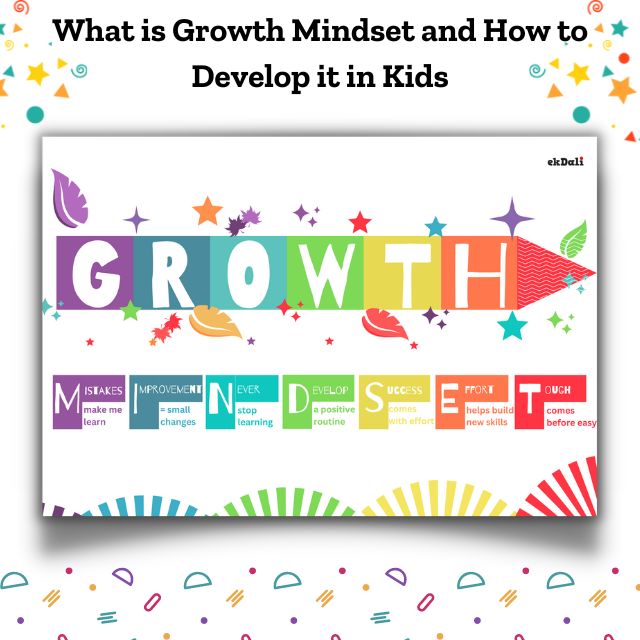We all have opinions about our own potential and skills. These ideas are a part of our mindset, which influences the decisions we make about what to do or not do as we move through life.A growth mindset is the conviction that, with work and the appropriate approaches, our intelligence and abilities can be enhanced.
On the other side, a fixed mindset holds that our intelligence and skills are largely constant and unalterable.
The enormous implications of these two mindsets—for both kids and adults—are probably already clear to you. It's a crucial element in terms of achievement and drive.
Here are 5 effective ways to teach a growth mindset in kids
-
Teach them that the Brain keeps growing
Kids become enthusiastic about learning when they realise that the brain literally forms new connections as they practise and acquire new skills.
I am an yoga teacher at a school and I had a 11 year old kid who was getting very frustrated because he could not get into some asanas. I was initially hesitant since I believed it might be beyond his understanding and because I didn't truly know how it operated. However, I reminded him right away that as he practises, his brain is rewiring itself and creating new connections that would make it simpler the next time. He actually understood this and I know this because he became less frustrated and slowly became very good at the practice.Learning about how children's brains develop and function , can help them develop a more positive outlook towards learning
-
Introduce the concept of Fixed Mindset and Growth mindset
Kids can begin to recognise growth and fixed mindsets in tale characters, other people, and even themselves when you teach them the fundamental distinctions between them.
Take a look at the Growth and fixed mindset poster that we have created for kids to understand the difference. You can buy the growth vs Fixed Mindset Poster in our website
-
Create Growth Mindset Models
Whatever you tell kids, cultivating your own growth attitude is the best way to impart it to others. After all, children pick up a lot of their attitudes and behaviour from the adults in their lives. One efficient approach to achieve this is to allow your children to overhear you thinking aloud while you face difficulties.
"This is too hard," instead. Say, "This is quite difficult for me. I should probably continue my practise.
rather than... I'm not able to do this. Keep going "I haven't figured this out yet."
Those are only two of many instances of growth mindsets in action. Having a development mindset yourself is the best way to inculcate one in your kids.
-
Tell them about your struggles and your mistakes
If you constantly try to keep your failures hidden from your kids, it's difficult to offer a good example of a growth attitude. It's only natural that we would wish to shield them. However, in this instance, sharing your troubles with your kids might be a gift they will cherish forever.
So, try sharing your blunders and the lessons you've learnt from them, including parenting mistakes. A growth mindset is one that sees failure as a launching pad for success. Children will be better able to do the same if they witness our shortcomings and hear how we deal with them, utilising them as a springboard for improvement.
-
The Power of Yet - “ Yet” is the magical word
I'm not a reader. No three-pointers can be made by me. I'm not good at biking.
Hearing a little child speak sad and irritated words is terrible. But with one easy tweak, it's a fantastic chance to talk about a growth attitude.
Teach your youngster to finish those phrases with the magical word yet.
I cannot read YET . I can't make any three-pointers YET.I can't ride a bike YET
A single word can significantly alter both the meaning of a statement and its future prospects!
Take a look at the Power of Yet poster that we have created for kids You can buy the Power of Yet Growth Mindset Poster in our website
These are just some strategies for Building a Growth Mindset in kids
























